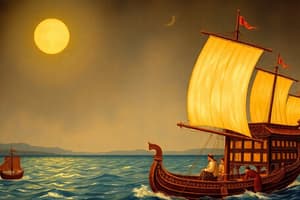Podcast
Questions and Answers
What significant change occurred after the Mongols were overthrown in China?
What significant change occurred after the Mongols were overthrown in China?
- The beginning of European colonization
- The decline of merchant status
- The rise of the Ming Dynasty (correct)
- The establishment of the Yuan Dynasty
Which Chinese emperor was known for sponsoring the expeditions of Zheng He?
Which Chinese emperor was known for sponsoring the expeditions of Zheng He?
- Qianlong
- Hong Wu
- Yong Lo (correct)
- Kangxi
What led Yong Lo to halt the maritime expeditions by the Chinese navy in 1433?
What led Yong Lo to halt the maritime expeditions by the Chinese navy in 1433?
- Pressure from European powers
- A lack of interest in trade
- The success of Zheng He's voyages
- A belief that they were a waste of resources (correct)
During what period did China develop a policy of isolationism in trade with Europe?
During what period did China develop a policy of isolationism in trade with Europe?
What was a result of the Chinese policy of establishing key port cities?
What was a result of the Chinese policy of establishing key port cities?
What is the significance of the Kowtow ritual in Qing China?
What is the significance of the Kowtow ritual in Qing China?
Which dynasty is considered the last imperial dynasty of China?
Which dynasty is considered the last imperial dynasty of China?
Why did the British encounter issues during their trade negotiations with China?
Why did the British encounter issues during their trade negotiations with China?
What factor contributed to the decline of the Ming Dynasty in the early 1600s?
What factor contributed to the decline of the Ming Dynasty in the early 1600s?
During which rulers did the Qing Dynasty reach its height of prosperity?
During which rulers did the Qing Dynasty reach its height of prosperity?
Flashcards
Ming Dynasty
Ming Dynasty
Chinese dynasty that overthrew the Mongols, marked by strong centralized rule and early exploration.
Zheng He
Zheng He
Chinese admiral who led large seafaring expeditions during the Ming dynasty, exploring the Indian Ocean.
Ming Isolationism
Ming Isolationism
The Ming dynasty's policy of limiting overseas trade and exploration after Zheng He's voyages.
Qing Dynasty
Qing Dynasty
Signup and view all the flashcards
Kangxi
Kangxi
Signup and view all the flashcards
Qianlong
Qianlong
Signup and view all the flashcards
Kowtow
Kowtow
Signup and view all the flashcards
Opium Wars
Opium Wars
Signup and view all the flashcards
Forbidden City
Forbidden City
Signup and view all the flashcards
Socioeconomic status in Ming/Qing China
Socioeconomic status in Ming/Qing China
Signup and view all the flashcards
Study Notes
Ming and Qing Dynasties
- The Mongols formed the Yuan Dynasty by assimilating into China.
- The Chinese overthrew the Mongols, establishing the Ming Dynasty.
- Hong Wu, a peasant, founded the Ming Dynasty.
- Yongle, Hong Wu's son, succeeded him.
- Yongle sponsored Zheng He's voyages of exploration.
- Zheng He explored the Indian Ocean using advanced Chinese junks.
- In 1433, Yongle halted the voyages, viewing them as a waste of resources.
- European powers subsequently entered the Indian Ocean region.
- The Ming Dynasty's decision to isolate itself from overseas exploration was influenced by China's substantial resources (silk, tea, spices), which made external trade less imperative.
- European exploration was often driven by colonization and resource acquisition, a contrasting approach to the Chinese approach.
- Vasco da Gama used forceful trade tactics.
- Between the 1400s and 1500s, China largely isolated itself from overseas trade with Europe.
- Trade was carefully managed through key port cities, where Europeans were restricted.
- High taxes were imposed on foreign trade.
- This led to a lively black market for luxury goods.
- Socioeconomic status was important. Merchants held higher economic status than peasants but lower than those producing in a Confucian ideal.
- The Forbidden City reflected Daoist principles of harmony with nature.
- The Ming Dynasty declined by the 17th century due to corruption, poor leadership, and heavy taxation.
- In 1644, the Manchus invaded China, establishing the Qing Dynasty.
- The Qing Dynasty was the last imperial dynasty of China.
Qing Dynasty
- The Qing Dynasty reached its peak of prosperity in the 18th century with strong rulers and a growing population.
- Kangxi (1661-1722) was an important Qing emperor.
- Qianlong (1735-1795), Kangxi's grandson, oversaw a period of significant prosperity.
- The Qing Dynasty's power and wealth was closely associated with these leaders.
- King George III of Britain attempted to increase trade with China.
- The British refused the kowtow ceremony, which the Chinese felt was deeply offensive.
- Qianlong responded with an insulting letter conveying China's self-sufficiency.
- The British, seeking valuable Chinese goods, started smuggling opium into China.
- This opium trade significantly weakened the Chinese economy.
- This weakened state made China susceptible to exploitation by other imperial powers (France, US, Russia, Japan).
Studying That Suits You
Use AI to generate personalized quizzes and flashcards to suit your learning preferences.




